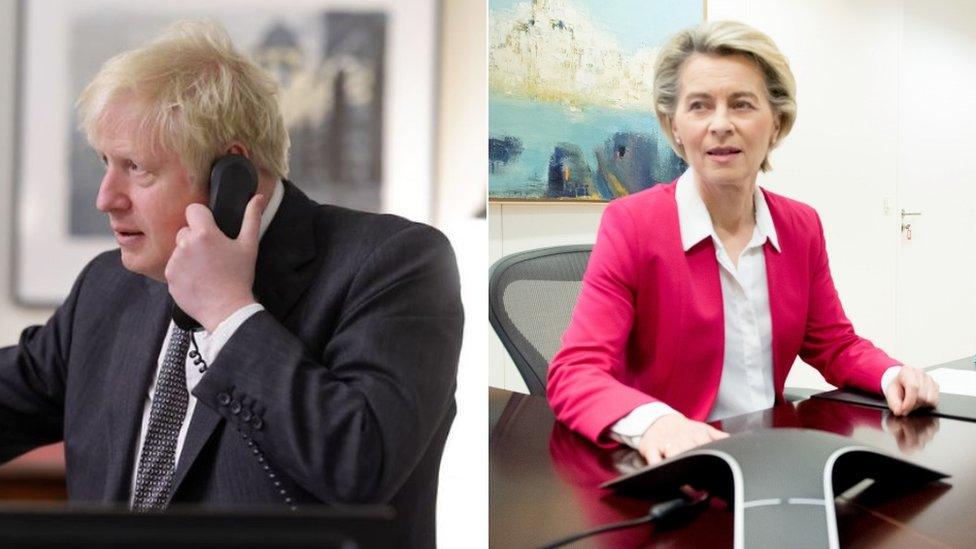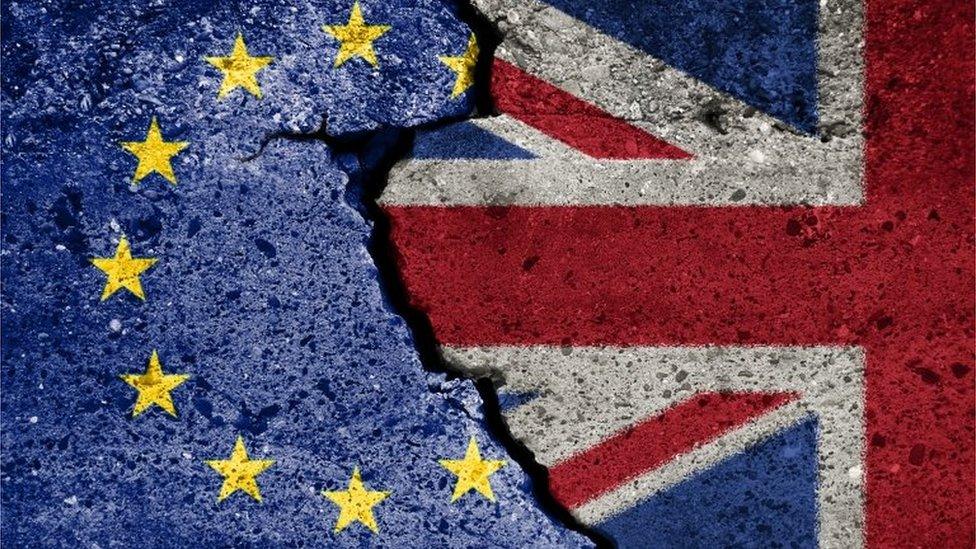Brexit: PM to meet EU chief in bid to save trade deal
- Published
- comments

UK Prime Minister Boris Johnson will travel to Brussels later this week to meet European Commission President Ursula von der Leyen in a last-ditch bid to reach a post-Brexit trade deal.
It comes after a 90-minute phone call between the two leaders on Monday failed to produce a breakthrough.
In a joint statement, they said the conditions for a deal were "not there".
"Significant differences" remained on fishing, business competition rules and governance of any deal, they added.
"We asked our chief negotiators and their teams to prepare an overview of the remaining differences to be discussed in a physical meeting in Brussels in the coming days," the leaders said.
BBC political editor Laura Kuenssberg said Wednesday or Friday appeared the "most likely" dates.
Labour welcomed the decision to keep talking, but shadow Cabinet Office minister Rachel Reeves said the prime minister should have been "more engaged in these negotiations months ago rather than leaving it to the 11th hour".
EU chief negotiator Michel Barnier and his UK counterpart Lord Frost have been locked in intensive talks for the past week. They will meet again on Tuesday to draw up a list of outstanding differences.
And on Thursday, EU leaders will meet at a summit in Brussels.

Brexit - The basics
Brexit happened but rules didn't change at once: The UK left the European Union on 31 January but leaders needed time to negotiate a deal for life afterwards - they got 11 months
Talks are on again: The UK and the EU have until 31 December to agree a trade deal as well as other things, such as fishing rights
If there is no deal: Border checks and taxes will be introduced for goods travelling between the UK and the EU. But deal or no deal, we will still see changes

A senior UK government source said: "Talks are in the same position now as they were on Friday. We have made no tangible progress. It's clear this must now continue politically."
They added that the government did not "consider this process to be closed" but "things are looking very tricky and there's every chance we are not going to get there".
The UK and EU have been trading for years without paying tariffs or doing customs or border checks.
Rules have stayed the same despite the UK leaving the EU on 31 January, but that is all set to change at the start of next year.
If an agreement is not reached and ratified by 31 December, the UK and EU could introduce import charges on each other's goods.
The UK's Office for Budget Responsibility has said leaving the EU customs union and single market without a trade deal could lead to a 2% reduction in national income next year.


True, there is only a tiny circle of people who know exactly what is going on.
But the messages coming out from the centre are that much more than a nip and tuck is required to get this done.
The leaders haven't asked their negotiators to have another go. They've asked them to sit down and make a list of all the things that are wrong.
In tone, it's very different to previous such moments, when they were required to put the icing on a cake that was very nearly baked.


News of the upcoming meeting between Boris Johnson and Ursula von der Leyen came as a bit of a relief to those close to the EU negotiating team.
There's been a sense of frustration building for months now at the circular nature of talks.
EU and UK negotiators say they've gone over and over the three main sticking points: fish, competition regulations and how to police a deal, if one is ever reached.
There's been mutual, mounting frustration at the perceived intransigence of the other side and a questioning of whether sitting down together one more time to repeat the same arguments - again - could ever be the solution.
Political intervention at the highest level has long been needed, to give a nod and a wink to negotiators to agree the difficult compromises, or to get involved in person.
Phone calls between the prime minister and the European Commission president (who represents all 27 EU countries in this case) have seemed inconclusive so far.
Face-to-face, this could be different. The two leaders might finally find agreement, give the decisive push to get there, or maybe jointly admit that this deal can't be done now.

What are they arguing about?
The UK and EU are at loggerheads over the so-called "level playing field" - a set of shared rules and standards to ensure businesses in one country do not have an unfair advantage over their competitors in others.
Brussels wants the UK to follow EU rules closely in areas such as workers' rights and environmental regulations, but the UK says the goal of Brexit is to break free from following common rules and reassert national sovereignty.
And the two sides disagree on how any future trading disputes should be resolved.
On fishing, the EU is warning that, without ongoing access to UK waters for its fleets, UK fishermen will no longer have special access to EU markets to sell their goods.
But the UK argues that what goes on in its own waters should be under its control as a sovereign country.
One issue resolved?
The UK and EU, however, appear to be moving closer to settling a dispute over last year's Withdrawal Agreement which, if resolved, would clear one potential obstacle to a trade deal.
Shortly before the two leaders spoke on the phone, the UK said it was willing to remove parts of the Internal Market Bill, legislation would give it the power to override the Brexit deal in defiance of international law.
The UK said a solution which would render the measures unnecessary could be found within days following separate discussions in Brussels involving Cabinet Office minister Michael Gove.
But later on Monday, MPs voted to reinstate the measures, which were taken out by the House of Lords last month, as a "fall back" option in case there is no agreement.


- Published7 December 2020
